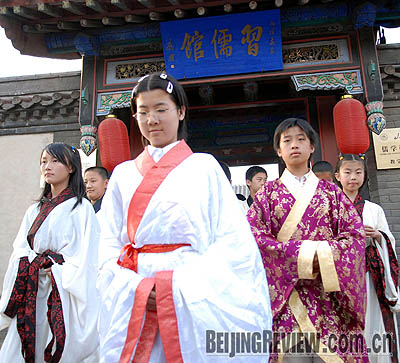|

PAST & PRESENT: A growing number of young Chinese see traditional hanfu costumes as an inseparable part of traditional festivals
The Dragon Boat Festival, also called the Double Fifth Festival, is celebrated on the fifth day of the fifth month of the Chinese lunar calendar. It is one of the most important Chinese festivals, with the Mid-Autumn Festival and the Spring Festival being the other two.
Today's celebrations of the festival center around dragon boat races. Competing teams row their colorful dragon boats forward to the rhythm of beating drums. The races date back about 2,300 years ago, and were inspired by the then villagers' valiant attempts to rescue Qu Yuan from the Miluo River. Qu was a poet and government official in the Warring States Period, a respected man, who drowned himself in the Miluo River after the king rejected his advice on governance. A special treat of this festival is zongzi, or glutinous rice dumpling. The tradition of zongzi is to remind people of the fishermen scattering rice across the water of the Miluo River in order to appease the fish so that they would not devour Qu.
However, Dragon Boat Festival has more significance than just the story of Qu Yuan. Many Chinese consider this time of year an especially dangerous time when extra efforts must be made to protect their family from illness.
According to Records of Rites, a Confucian classic, in the fifth lunar month, yang, which represents life, begins to decline, while yin, which represents death, begins to reemerge and grow. Therefore, ancient Chinese regarded the fifth lunar month as a time when the balance between yin and yang is broken and all kinds of diseases can strike.
To remain healthy, in ancient times several methods were used. People made herbal soup to drink and also bathe in. Adults would also drink a special wine to remove poisons from the body. Families hung various herbs on their gates for protection, while sachets that contain various fragrant medicinal herbs were worn to keep the wearer from contracting any illness. In addition, to fend off evil spirits, families put pictures of Zhong Kui, a god who is believed to be able to guard against evil, on the front doors of their homes, and people wore charms and talismans. Pictures of the five deadly venoms, namely, scorpions, centipedes, toads, snakes and spiders, were also used to exorcise evil with evil. Thus, the original cultural basis for Dragon Boat Festival is the removal of evil spirits and illness.
Throughout the history of more than 2,000 years, the Dragon Boat Festival has always been a grand event in China. In May 20, 2006, it was listed as one of China's first state-level Intangible Cultural Heritages. The Dragon Boat Festival has been designated as a legal holiday since 2008, making it possible for the Chinese to celebrate in the traditional way.
With its rapid economic growth, China is paying more attention to the protection and improvement of historical and cultural relics. At the same time, the Chinese are eagerly trying to find out more of the nation's fine traditions, including a variety of traditional festivals, hoping to preserve their national identity in a world of rapid globalization.
Hanfu revival
A phenomenon closely connected with Chinese history and culture, which began to emerge in 2003, is the revival of hanfu, something that featured prominently at this year's celebrations of the Dragon Boat Festival. Hanfu is the traditional clothing of the Han people, who constitute the largest ethnic group in China in terms of population. For more than 5,000 years, all of the Han people wore this costume. Its dominant status was interrupted in the 17th century, when minority Manchu rulers of the Qing Dynasty (1644-1911) prohibited it, something that led in time to the garments not being widely regarded as a Chinese national costume and even led to its disappearance.
Confucius (551-479 B.C.), one of China's greatest philosophers and educators, considered hanfu a required part of Chinese ceremonies and rituals and many of his quotations contain references to this costume. In this sense, hanfu is a symbol of thousands of years' traditional culture of the Han people and an important part of this ethnic group's courteous lifestyle.
No matter how the patterns of hanfu have changed over different dynasties, the basic collar, sleeves and buttonless features remained unchanged. Many traditional costumes of Asian countries, such as the kimono in Japan and Korean traditional dress hanbok, are heavily influenced by hanfu.
At a time when cultural traditions are highly valued, hanfu's revival seems a natural progression.
At this year's Dragon Boat Festival on June 8, many hanfu lovers gathered in Beijing's Baoguo Temple, marking the festival in the traditional way. Co-organized by the China Cultural Relics Preservation Foundation, Beijing Collectors Association and Beijing Baoguo Temple Collection Market Co. Ltd., and sponsored by several Han culture protection organizations, hanfu advocates hoped to awaken people's awareness of cultural heritage protection and to inspire more people, especially the younger generation, to take active steps to protect the country's past.
At the beginning of the ceremony, participants recited Qu Yuan's Ode to Tangerines, a poem showing the writer's deep love for his motherland. At a time when southwest China's Sichuan Province is recovering from a devastating earthquake, hanfu supporters hoped to express their devotion and love to the nation through the patriotic words.
After the recital, they presented a show of various styles of hanfu and celebrated the day by eating zongzi, making sachet and drinking cleansing wine.
While the culturally rich Dragon Boat Festival is nowadays jokingly referred to as the Zongzi Festival and risks losing its true meaning, to see so many young people dressed in hanfu and picking up the threads of their traditional customs is good news for the future of Chinese culture. |
